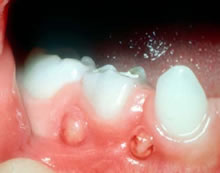Many think if you have tooth abscess, infection, you must have pain. This is not always the case since abcessed teeth can sometimes be dead and will not trigger our pain response.
I tried to find the best way to explain what tooth abscess really is, but when there are already many reviewed articles published on sites trusted such as nih.gov, I probably would come short with words in comparison. So I take the liberty of posting this wonderful reviewed article that explains what tooth abscess is. Please ask your questions by going to info@918dentist.com or simply click on comment section below.
Tooth abscess
Periapical abscess; Dental abscess; Tooth infection; Abscess – tooth
Last reviewed: February 22, 2012.
A tooth abscess is a collection of infected material (pus) due to a bacterial infection in the center of a tooth.
Causes, incidence, and risk factors
A tooth abscess is a complication of tooth decay. It may also result from trauma to the tooth, such as when a tooth is broken or chipped. Openings in the tooth enamel allow bacteria to infect the center of the tooth (the pulp). Infection may spread out from the root of the tooth and to the bones supporting the tooth.
Infection results in a collection of pus (dead tissue, live and dead bacteria, white blood cells) and swelling of the tissues within the tooth. This causes a painful toothache. If the pulp of the tooth dies, the toothache may stop, unless an abscess develops. This is especially true if the infection remains active and continues to spread and destroy tissue.
Symptoms
The main symptom is a severe toothache. The pain is continuous and may be described as gnawing, sharp, shooting, or throbbing.
Other symptoms may include:
•
Bitter taste in the mouth
•
Breath odor
•
General discomfort, uneasiness, or ill feeling
•
Fever
•
Pain when chewing
•
Sensitivity of the teeth to hot or cold
•
Swelling of the gum over the infected tooth, that may look like a pimple
•
Swollen glands of the neck
•
Swollen area of the upper or lower jaw — a very serious symptom
Signs and tests
The dentist will closely look at your teeth, mouth, and gums. You may have pain when the dentist taps the tooth. Biting or closing the mouth tightly also increases the pain. The gums may be swollen and red and may drain thick material.
Dental x-rays and other tests can help your dentist determine which tooth or teeth is causing the problem.
Treatment
The goals of treatment are to cure the infection, save the tooth, and prevent complications.
Antibiotics may be given to fight the infection. Warm salt-water rinses may be soothing. Over-the-counter pain relievers may relieve the toothache and fever.
Do NOT place aspirin directly over the tooth or gums, because this increases irritation of the tissues and can result in mouth ulcers.
A root canal may be recommended in an attempt to save the tooth.
If there is a severe infection, the tooth may be removed or surgery may be needed to drain the abscess. Some people may need to be admitted to the hospital.
Expectations (prognosis)
Untreated abscesses may get worse and can lead to life-threatening complications.
Prompt treatment usually cures the infection. The tooth can usually be saved in many cases.
Complications
•
Loss of the tooth
•
Blood infection (sepsis)
•
Spread of infection to soft tissue (facial cellulitis, Ludwig’s angina)
•
Spread of infection to the jaw bone (osteomyelitis of the jaw)
•
Spread of infection to other areas of the body resulting in brain abscess, endocarditis, pneumonia, or other complications
Calling your health care provider
Call your dentist if you have a persistent, throbbing toothache.
Prevention
Prompt treatment of dental caries reduces the risk of tooth abscess. Traumatized teeth should be examined promptly by the dentist.
Review Date: 2/22/2012.
Reviewed by: Paul Fotek, DMD, Florida Institute for Periodontics & Dental lmplants, West Palm Beach, FL. Review provided by VeriMed Healthcare Network. Also reviewed by David Zieve, MD, MHA, Medical Director, A.D.A.M. Health Solutions, Ebix, Inc.
